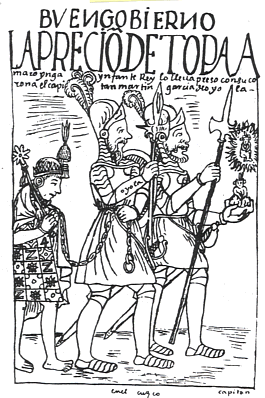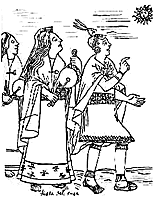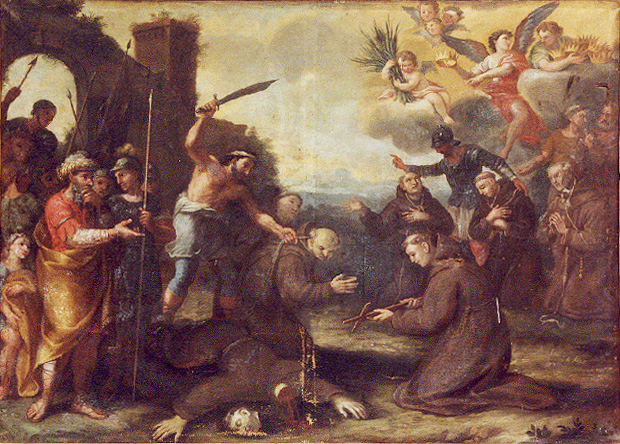|
Francisco De Toledo (bishop)
Francisco Álvarez de Toledo ( Oropesa, 10 July 1515 – Escalona, 21 April 1582), also known as ''The Viceroyal Solon'', was an aristocrat and soldier of the Kingdom of Spain and the fifth Viceroy of Peru. Often regarded as the "best of Peru's viceroys", he is as often denounced for the negative impact his administration had on the Indigenous peoples of Peru. Toledo brought stability to a tumultuous viceroyalty of Spain and enacted administrative policies which changed the character of Spanish colonial rule and the relationship between the Indigenous peoples of the Andes and their Spanish overlords. With a policy called "reductions", Toledo forcibly relocated many of the Indigenous peoples of Peru and Bolivia into new settlements in order to enforce their Christianization, collect tributes and taxes, and gather Indigenous labor to work in mines and other Spanish enterprises. He has been condemned for the reductions, expanding the forced labor demanded of the Indigenous peo ... [...More Info...] [...Related Items...] OR: [Wikipedia] [Google] [Baidu] |
The Most Excellent
The Most Excellent (Spanish language, Spanish: ''Excelentísimo Señor'' (male) or ''Excelentísima Señora'' (female), literally "Most Excellent Sir/Madam") is an honorific prefix that is traditionally applied to certain people in Spain and certain Spanish-speaking countries. Following Spanish tradition, it is an ''ex officio'' style (the holder has it as long as they remain in office, in the most important positions of state) and is used in written documents and very formal occasions. The prefix is similar (but not equal) to that of "Excellency, His/Her Excellency", but in the 19th century "The Most Excellent" began to replace the former. The use of the prefix Excellency was re-introduced in Francoist Spain by ''Generalísimo'' Francisco Franco himself, who was formally styled as ''Military career and honours of Francisco Franco, Su Excelencia el Jefe del Estado'' ("His Excellency The Head of State"), while his ministers and senior government officials continued using the prefix ... [...More Info...] [...Related Items...] OR: [Wikipedia] [Google] [Baidu] |
Spanish Colonization Of The Americas
Spain began colonizing the Americas under the Crown of Castile and was spearheaded by the Spanish . The Americas were invaded and incorporated into the Spanish Empire, with the exception of Brazil, British America, and some small regions of South America and the Caribbean. The crown created civil and religious structures to administer the vast territory. The main motivations for colonial expansion were profit through resource extraction and the spread of Catholicism by converting indigenous peoples. Beginning with Columbus's first voyage to the Caribbean and gaining control over more territory for over three centuries, the Spanish Empire would expand across the Caribbean Islands, half of South America, most of Central America and much of North America. It is estimated that during the colonial period (1492–1832), a total of 1.86 million Spaniards settled in the Americas, and a further 3.5 million immigrated during the post-colonial era (1850–1950); the esti ... [...More Info...] [...Related Items...] OR: [Wikipedia] [Google] [Baidu] |
Álvarez De Toledo
Álvarez or Álvares may refer to: People *Álvarez (surname), Spanish surname Places *Alvares (river), a river in northern Spain *Alvares (ski resort), in Iran *Alvares, Iran * Alvares, Portugal *Álvarez, Santa Fe, a town in the province of Santa Fe, Argentina *Álvarez, Tamaulipas, Mexico *Alvarez Glacier, Antarctica *General Mariano Alvarez, Cavite, Philippines * Los Alvarez, Texas, US * 3581 Alvarez, an asteroid Other uses * Alvarez (''Gotham''), a character in the TV series ''Gotham'' * Manny Alvarez, a character in ''The Last of Us Part II'' *Alvarez Guitars, an acoustic guitar manufacturer *"Alvarez", a song by the band Funeral for a Friend See also *Álvares, a Portuguese and Galician surname *Alvarez' syndrome Alvarez' syndrome is a medical disorder in which the abdomen becomes bloated without any obvious reason, such as intestinal gas Flatulence, in humans, is the expulsion of gas from the intestines via the anus, commonly referred to as farting. ..., a medica ... [...More Info...] [...Related Items...] OR: [Wikipedia] [Google] [Baidu] |
Ascetic
Asceticism (; from the el, ἄσκησις, áskesis, exercise', 'training) is a lifestyle characterized by abstinence from sensual pleasures, often for the purpose of pursuing spiritual goals. Ascetics may withdraw from the world for their practices or continue to be part of their society, but typically adopt a frugal lifestyle, characterised by the renunciation of material possessions and physical pleasures, and also spend time fasting while concentrating on the practice of religion or reflection upon spiritual matters. Various individuals have also attempted an ascetic lifestyle to free themselves from addictions, some of them particular to modern life, such as money, alcohol, tobacco, drugs, entertainment, sex, food, etc. Asceticism has been historically observed in many religious traditions, including Buddhism, Jainism, Hinduism, Islam, Christianity, Judaism, Stoicism and Pythagoreanism and contemporary practices continue amongst some religious followers. The practition ... [...More Info...] [...Related Items...] OR: [Wikipedia] [Google] [Baidu] |
Luis E
Luis is a given name. It is the Spanish form of the originally Germanic name or . Other Iberian Romance languages have comparable forms: (with an accent mark on the i) in Portuguese and Galician, in Aragonese and Catalan, while is archaic in Portugal, but common in Brazil. Origins The Germanic name (and its variants) is usually said to be composed of the words for "fame" () and "warrior" () and hence may be translated to ''famous warrior'' or "famous in battle". According to Dutch onomatologists however, it is more likely that the first stem was , meaning fame, which would give the meaning 'warrior for the gods' (or: 'warrior who captured stability') for the full name.J. van der Schaar, ''Woordenboek van voornamen'' (Prisma Voornamenboek), 4e druk 1990; see also thLodewijs in the Dutch given names database Modern forms of the name are the German name Ludwig and the Dutch form Lodewijk. and the other Iberian forms more closely resemble the French name Louis, a derivat ... [...More Info...] [...Related Items...] OR: [Wikipedia] [Google] [Baidu] |
Vilcabamba, Peru
Vilcabamba (in Hispanicized spelling), Willkapampa (Aymara and Quechua) is often called the Lost City of the Incas. Vilcabamba means "sacred plain" in Quechua. The modern name for the Inca ruins of Vilcabamba is Espiritu Pampa (Plain of the Spirits). Vilcabamba is located in Echarate District of La Convención Province in the Cuzco Region of Peru. Vilcabamba was the capital of the Neo-Inca State from 1539 to 1572. The Neo-Inca State was the last refuge of the Inca Empire until it fell to the Spaniards and their indigenous allies in 1572, signaling the end of Inca resistance to Spanish rule. Subsequently, Vilcabamba was abandoned and its location forgotten. In 1911 explorer Hiram Bingham mistakenly identified the abandoned ruin of Machu Picchu as Vilcabamba, but he also visited a ruin called Espiritu Pampa by local Peruvians. In 1964, Gene Savoy identified Espiritu Pampa as the fabled Vilcabamba, a designation widely accepted by archaeologists and historians. Vilcabamba or Espir ... [...More Info...] [...Related Items...] OR: [Wikipedia] [Google] [Baidu] |
Neo-Inca State
The Neo-Inca State, also known as the Neo-Inca state of Vilcabamba, was the Inca state established in 1537 at Vilcabamba by Manco Inca Yupanqui (the son of Inca emperor Huayna Capac). It is considered a rump state of the Inca Empire (1438–1533), which collapsed after the Spanish conquest in the mid-1530s. The Neo-Inca State lasted until 1572, when the last Inca stronghold was conquered, and the last ruler, Túpac Amaru (Manco's son), was captured and executed, thus ending the political authority of the Inca state. History Inca retreat to Vilcabamba The Vilcabamba region had been part of the Inca Empire since the reign of Pachacuti (1438–1471). During the Spanish conquest of Peru, Túpac Huallpa was a puppet ruler crowned by the conquistador Francisco Pizarro. After his death, Manco Inca Yupanqui joined Francisco Pizarro and Diego de Almagro in Cajamarca. When Pizarro's force arrived in Cusco, he had the ''caciques'' acknowledge Manco as their Inca. Manco Inca then joined Al ... [...More Info...] [...Related Items...] OR: [Wikipedia] [Google] [Baidu] |
Túpac Amaru
Túpac Amaru (1545 – 24 September 1572) (first name also spelled Tupac, Topa, Tupaq, Thupaq, Thupa, last name also spelled Amaro instead of Amaru) was the last Sapa Inca of the Neo-Inca State, the final remaining independent part of the Inca Empire. He was executed by the Spanish following a months-long pursuit after the fall of the Neo-Inca State. His name is derived from the Quechua words ''thupaq'', meaning "royal" or "shining" and ''amaru'', which can either mean "snake" or refer to the snake-like being from Andean mythology. Accession Following the Spanish conquest of Peru in the 1530s, a few members of the royal family established the small independent Neo-Inca State in Vilcabamba, which was located in the relatively inaccessible Upper Amazon to the northeast of Cusco. The founder of this state was Manco Inca Yupanqui (also known as Manco Cápac II), who had initially allied himself with the Spanish, then led an unsuccessful war against them before establishing hims ... [...More Info...] [...Related Items...] OR: [Wikipedia] [Google] [Baidu] |
Inca Empire
The Inca Empire (also known as the Incan Empire and the Inka Empire), called ''Tawantinsuyu'' by its subjects, (Quechua for the "Realm of the Four Parts", "four parts together" ) was the largest empire in pre-Columbian America. The administrative, political and military center of the empire was in the city of Cusco. The Inca civilization arose from the Peruvian highlands sometime in the early 13th century. The Spanish began the conquest of the Inca Empire in 1532 and by 1572, the last Inca state was fully conquered. From 1438 to 1533, the Incas incorporated a large portion of western South America, centered on the Andean Mountains, using conquest and peaceful assimilation, among other methods. At its largest, the empire joined modern-day Peru, what are now western Ecuador, western and south central Bolivia, northwest Argentina, the southwesternmost tip of Colombia and a large portion of modern-day Chile, and into a state comparable to the historical empires of Eurasia ... [...More Info...] [...Related Items...] OR: [Wikipedia] [Google] [Baidu] |
Mit'a
Mit'a () was mandatory service in the society of the Inca Empire. Its close relative, the regionally mandatory Minka is still in use in Quechua communities today and known as ''faena'' in Spanish. Historians use the Hispanicized term ''mita'' to differentiate the system as it was modified and intensified by the Spanish colonial government, creating the encomienda system. ''Mit'a'' was effectively a form of tribute to the Inca government in the form of labor, i.e. a corvée. Tax labor accounted for much of the Inca state tax revenue; beyond that, it was used for the construction of the road network, bridges, agricultural terraces, and fortifications in ancient Peru. Military service was also mandatory. All citizens who could perform labor were required to do so for a set number of days out of a year (the basic meaning of the word ''mit'a'' is a regular ''turn'' or a ''season''). The Inca Empire's wealth meant a family often needed only 65 days to farm; the rest of the year was ... [...More Info...] [...Related Items...] OR: [Wikipedia] [Google] [Baidu] |
Forced Conversion
Forced conversion is the adoption of a different religion or the adoption of irreligion under duress. Someone who has been forced to convert to a different religion or irreligion may continue, covertly, to adhere to the beliefs and practices which were originally held, while outwardly behaving as a convert. Crypto-Jews, crypto-Christians, crypto-Muslims and crypto-Pagans are historical examples of the latter. Religion and power In general, anthropologists have shown that the relationship between religion and politics is complex, especially when viewed over the expanse of human history.Firth, Raymond (1981Spiritual Aroma: Religion and Politics ''American Anthropologist'', New Series, Vol. 83, No. 3, pp. 582–601 While religious leaders and the state generally have different aims, both are concerned with power and order; both use reason and emotion to motivate behavior. Throughout history, leaders of religious and political institutions have cooperated, opposed one another, and ... [...More Info...] [...Related Items...] OR: [Wikipedia] [Google] [Baidu] |





